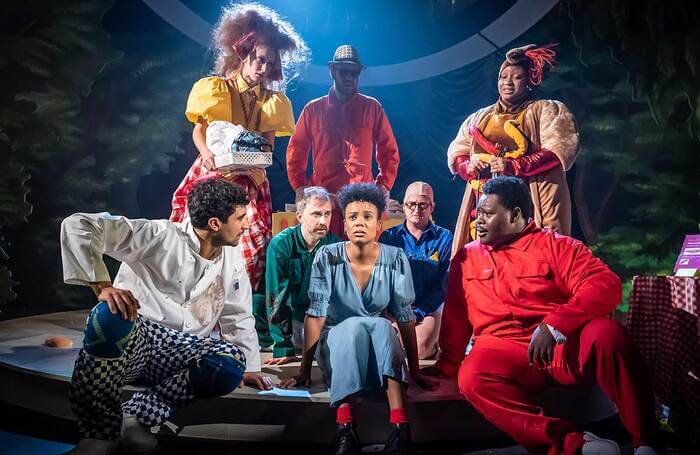
★★★★
The Wonderful World of Dissocia at Theatre Royal Stratford East: deliciously free, bordering on random
EVENING STANDARD REVIEW
This play of two halves offers witty jokes and a profound second act
Leah Harvey in The Wonderful World of Dissocia at Theatre Royal Stratford East
A profane, madcap, Alice-in-Wonderland trip morphs into something much more profound in Anthony Neilson’s weirdly compelling 2004 study of mental instability. I’ve rarely seen a play made up of two such tonally different acts: and here a succinct and moving second half contextualises and clarifies the ragtag, playful first. Emma Baggott’s revival is grounded from beginning to end by a fine central performance from Leah Harvey, focused and magnetic amid external and internal disorder.
Harvey, who uses the pronouns they/them, plays Lisa, apparently a young woman in a modern city: our only anchor in time or place is that she listens to an iPod. Lisa is dispatched by a watchmender to the abstract world of Dissocia to find the hour of her life she lost when returning from New York. The watchmender drinks urine, by the way – other people’s, not his own – and Dissocia is reached by an imaginary lift that goes sideways, as well as up and down.
Once in this absurdist, cartoonish realm, the cool and logical Lisa interacts at length with two uniformed men who are desperate to be liked. They’re INSECURITY Guards! Neilson overeggs this gag, and subsequent ones about a cloven-hoofed ruminant who wants to be blamed for everything (a scapegoat, geddit?) and a hot dog stand that was a lost property office until it got lost.
When the scapegoat tries to violate Lisa – and a female council official takes her place in order to get victim numbers, if not crime numbers, down – it’s the first sign of something darker than late-period Python. That Dissocia has lost its queen and is under attack from the forces of the Black Dog hints that Lisa’s lost hour is a metaphor for depression.
Neilson originally workshopped this play with drama students, which may be why it feels deliciously free, bordering on random. The jokes are hilarious, often edgy, simultaneously clever and daft. There are two songs, again Pythonesque: a wry meditation on the nature of time from Lisa, and a light tune about death from a teddy bear in a suit.
Baggott conducts the first half like a superior panto, on primary-coloured cutout sets by Grace Smart, with deadly-earnest performances from a fine cast. It’s very funny, if sometimes forced and rambling. Laughing along, I wondered why on earth Baggott had revived something so ephemeral.
The second half brought me bracingly back to earth: in pin sharp, snapshot scenes, it deftly suggests the medical and emotional burdens that Lisa is under, necessitating her escape to Dissocia. Neilson will make jokes about just about anything, but he doesn’t trivialise or romanticise mental illness at all.
Harvey meets each twist of the script with steady aplomb, while the supporting ensemble furnish a vivid gallery of grotesques. I can understand why some might abandon this play at half time. But trust me: the experience is transformed if you stay.
Theatre Royal Stratford East, to 15 Oct; stratfordeast.com
The Wonderful World of Dissocia review – whimsical and brutal
Theatre Royal Stratford East, London
GUARDIAN REVIEW
At first, Anthony Neilson’s play is a bewildering affair, but its sombre aftermath imparts understanding with crushing effect
Anthony Neilson’s 2004 drama about dissociative identity disorder is a reminder to never judge a play at the interval. It is certainly tempting to write the whole thing off as we are dragged through the irrational and kooky first half. Everything changes in the short, stark, second act and radically transforms our experience.
Leah Harvey plays Lisa, a woman who falls down the rabbit hole of her mental illness into a fantasy world of surreal creatures, from a sexually violent goat to a bear singing about brain death. The borrowed motifs from other lands are easy to spot, from Lewis Carroll’s Wonderland to CS Lewis’s Narnia and Eugène Ionesco’s absurdist universe, all set against flat picture-book backdrops (designed by Grace Smart).
Directed by Emma Baggott, this feels naively charming at first, then befuddling and finally infuriating with its surfeit of whimsy. The laddish toilet humour is uncouth, the linguistic jokes try too hard: there are “time flies”, which buzz around at times of happiness, and insecurity guards (“If it’s secure why would you have to guard it?”).
It is clear this world is allegorical but the signposting seems deliberately withheld. A character defining the meaning of a wild goose chase says it is when “you are hunting for nothing” and it feels like a description of this play as it descends into ever more random circles of phantasmagoria.
The second half is as sombre as the first is lurid, showing Lisa inside a psychiatric ward. The repetition of days filled with sleep, medication and desultory staff carries grinding force. The set, now stark, feels like a cell. The psychiatric system is not shown as especially cruel but appears no less heinous for its indifference and immobilising medication culture. Lisa lies in a doped state, with moments of boredom, frustration and loneliness. Her relationships are few now but dramatised with delicacy.
It feels moving rather than manipulative, as we realise, retrospectively, that we have been positioned inside Lisa’s head in the first half, experiencing her scrambled worlds. That these are summoned rather crassly matters less than the meaning its switching brings. This revival more than stands the test of time in its portrait of mental illness – it is original, brutal, memorable.